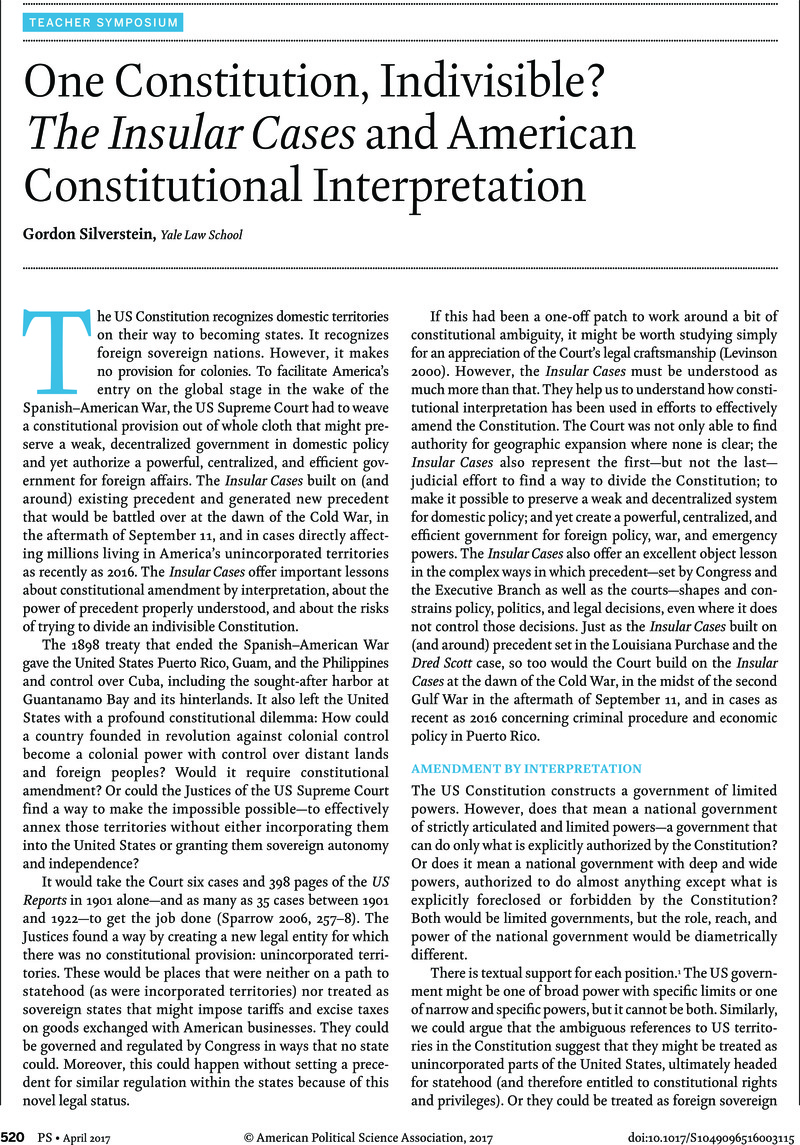No CrossRef data available.
Article contents
One Constitution, Indivisible? The Insular Cases and American Constitutional Interpretation
Published online by Cambridge University Press: 31 March 2017
Abstract
An abstract is not available for this content so a preview has been provided. Please use the Get access link above for information on how to access this content.

- Type
- Symposium: “Disembodied Shades”: Teaching the Territories of the United States
- Information
- Copyright
- Copyright © American Political Science Association 2017
References
REFERENCES
Agreement between the United States and Cuba
. February 23, 1903. Available at http://avalon.law.yale.edu/20th_century/dip_cuba002.asp.Google Scholar
Gallatin, Albert. 1803. Letter to Thomas Jefferson. Available at http://founders.archives.gov/documents/Jefferson/01-39-02-0281.Google Scholar
Goldsmith, Jack. 2007. The Terror Presidency: Law and Judgment inside the Bush Administration. New York: W.W. Norton.Google Scholar
Levinson, Sanford. 2000. “Why the Canon Should be Expanded to Include the Insular Cases and the Saga of American Expansionism [Symposium: The Canon(s) of Constitutional Law] 17 Constitutional Commentary 241.Google Scholar
Ryan, Allan. 2015. The 9/11 Terror Cases: Constitutional Challenges in the War against Al Qaeda. Lawrence: University Press of Kansas.Google Scholar
Silverstein, Gordon. 1997. Imbalance of Powers: Constitutional Interpretation and the Making of American Foreign Policy. New York: Oxford University Press.Google Scholar
Silverstein, Gordon. 2009. “The Law: Bush, Cheney and the Separation of Powers—A Lasting Legal Legacy?”
Presidential Studies Quarterly
39: 878–95.Google Scholar
Silverstein, Gordon. 2011. “U.S. War and Emergency Power: The Virtues of Constitutional Ambiguity.”
Annual Review of Law and Social Science. 237–67.Google Scholar
Sparrow, Bartholomew. 2006. The Insular Cases and the Emergence of American Empire. Lawrence: University Press of Kansas.Google Scholar
Yoo, John. 2005. The Powers of War and Peace: The Constitution and Foreign Affairs after 9/11. Chicago: University of Chicago Press.Google Scholar


